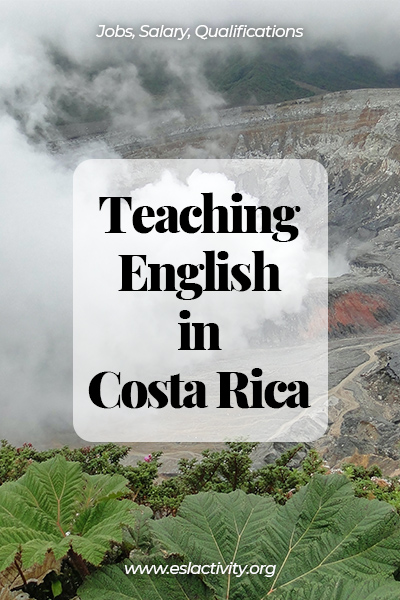Costa Rica is a popular travel destination in Central America. This amazing country is known for its national parks, volcanoes, food, rainforests, and beach. If you love wildlife and going on adventures, you should consider teaching English in Costa Rica. Also, you will be able to easily travel to other countries in Central and South America like Brazil, Colombia, Ecuador, and Argentina.

How to Teach ESL in Costa Rica
Like other Central American countries, Costa Rica also has a high demand for ESL teachers. The demand is especially high among working adults who are in the tourism industry or in the international business sector. Therefore, there is a great chance for ESL instructors to find English teaching job opportunities in Costa Rica.
Teaching abroad is common for English teachers. However, finding and choosing the best country can be challenging as everyone has different priorities. Continue reading to learn about teaching ESL in Costa Rica and see if it is the right place for you.
Teaching English in Costa Rica
Most of the ESL teachers who travel to Costa Rica tend to locate in the Central Valley. It is the union of Costa Rica’s main cities, including San Jose, Heredia, Alajuela, and Cartago. Because Central Valley includes the major areas, including the capital city, teachers will have the highest chance of finding a TEFL job here.
English Teaching Jobs in San Jose
San Jose is the capital city of Costa Rica. It is a busy, fast-paced, and exciting city. A large number of people living in San Jose are willing to learn English for better job opportunities. San Jose is a great place to live as you can use cheap public transportation to go anywhere in the city.
If you are willing to live like the locals, it is possible to enjoy a fairly low cost of living. However, bringing in the lifestyle from North America is considered luxurious and can cost a bit in San Jose and other parts of Costa Rica. The best choice of teaching institutions in San Jose is international schools, language schools, and universities.

English Teaching Jobs in Costa Rica
Requirements for Teaching English in Costa Rica
Including Costa Rica, most of the countries in Central America have relatively low expectations of qualifications from ESL teachers. This is great for English teachers who are just beginning to build their careers. The most common qualifications for ESL teachers in Costa Rica are:
- TEFL certificate
- Native English speaker
Most of the English teaching jobs in Costa Rica will not require a university degree. Therefore, if you are a native English speaker, the only thing you will need is a TEFL certificate. However, if you don’t have it, do not worry. You can easily take TEFL courses online or at a language institute.
English Teaching Jobs in Costa Rica
The four main English teaching options are language schools, universities, business classes, and private tutoring. Each option has its own pros and cons. Go over the list and see which is your favorite option. You might choose more than one option for extra cash, which many ESL teachers working abroad do.
Language Schools
In Costa Rica, language schools are probably the most popular type of ESL teaching institution. These private schools are one of the biggest employers for English teachers. In most cases, the schools will provide instructors with curriculum and class materials. Therefore, you will need to work less outside the class preparing for lessons. The type of class and size will vary depending on the school. You can teach both one-on-one and group classes.
Universities
Although you do not need a lot in order to teach English in Costa Rica, universities can be an exception. Universities in Costa Rica can look for higher qualifications, including a bachelor’s degree, TEFL (or TESOL, CELTA) certificate, and prior teaching experience. In addition, universities’ teaching environment and salary tend to be better than in other institutions. Therefore, securing an English teaching job in universities is competitive.
Business Classes
This is a great job opportunity for TEFL teachers who want to teach adults rather than younger students. Many language institutes will provide business English classes to working adults. Due to the growth of the tourism industry and the number of global corporations in Central America, learning English has become important to locals. Costa Rican people who are looking for better job opportunities are willing to learn business English from native speakers. However, if you choose this option, you will have to teach before and after business hours as these people have full-time or part-time jobs.
Private Tutoring
ESL teachers who wish to save extra cash often choose to give private lessons. Frequently, teachers will be able to charge a higher hourly salary for private English lessons in Costa Rica. However, it can be challenging to find students right away without a proper network. Once you get a full-time job and get to know the local people, finding students wishing to take private English lessons will become easier. Although you might get paid more than teaching at schools, relying on private tutoring as a full-time job is not recommended because of the inconsistency. Also, check with your full-time job contract to avoid violating any terms.

Teaching English in Costa Rica
Teaching English in Costa Rica Salary
The average salary of ESL teachers in Costa Rica is around $800-$1,000 (USD). Compared to the salary in North America, it is comparably low. However, keep in mind that the cost of living is also lower in Costa Rica and other Central American countries. You might not be able to save cash, but you will make enough to cover the basic expenses and purchase necessities. In addition, if you want to make extra cash, private tutoring or teaching English online is always an option.
Things to Consider When Teaching in Costa Rica
Although the cost of living is quite low, your monthly salary might not be enough to live a luxurious life in Costa Rica. It is important to beware that you will be making a break-even salary. Therefore, you can consider a few ways to reduce your expenses. For instance, you can save a lot by sharing housing. Furthermore, try to live like the local Costa Ricans. If you decide to eat out every day, you will be short on cash. However, again, private tutoring can act as a supplementary source of income.
Should I Teach ESL In Costa Rica?
Deciding whether to teach English as a Second Language (ESL) in Costa Rica or any other country depends on your personal preferences, goals, and circumstances. To help you make an informed decision, consider the following factors:
Interest in Teaching
Are you passionate about teaching English and helping others improve their language skills? Teaching ESL requires patience, adaptability, and a genuine interest in working with students of diverse backgrounds.
Cultural Experience
Teaching ESL in Costa Rica can provide a rich cultural experience. The country is known for its natural beauty, warm climate, and friendly people. If you’re interested in immersing yourself in a new culture and exploring a different way of life, Costa Rica can offer unique opportunities.
Language Learning Environment
Costa Rica is a Spanish-speaking country, and many locals may have limited proficiency in English. If you’re interested in improving your own Spanish language skills, teaching ESL in Costa Rica can provide a conducive environment for language immersion and practice.
Teaching Opportunities
Consider the demand for ESL teachers in Costa Rica and the availability of job opportunities. Research the job market, including requirements, salaries, and potential employers, to ensure that you can find suitable employment.
Qualifications and Experience
Determine if you meet the necessary qualifications and experience for teaching ESL in Costa Rica. While requirements may vary, having a bachelor’s degree and an ESL teaching certification (such as TEFL or TESOL) can enhance your chances of finding desirable positions.
Financial Considerations
Evaluate the cost of living in Costa Rica and compare it to the potential income from teaching ESL. Consider your financial situation and whether you can comfortably support yourself while living and working in the country.
Long-Term Plans
Reflect on your long-term goals. Are you looking for a temporary teaching experience or a more extended stay? Consider how teaching ESL in Costa Rica fits into your broader plans and aspirations.
Final Thoughts about Teaching ESL In Costa Rica
It’s important to conduct thorough research, speak to other ESL teachers, and potentially visit Costa Rica before making a final decision. This will allow you to gather more information and gain a better understanding of whether teaching ESL in Costa Rica aligns with your interests and goals.
FAQs About Teaching English in Costa Rica
Here is a quick guide to some commonly asked questions about being an English teacher in Costa Rica.
How much does an English teacher make in Costa Rica?
On average, Costa Rica teacher salary is between 800 and 1,000 USD monthly. This is a break-even salary which is enough to cover the basic costs of living in Costa Rica.
Do I need a degree to teach in Costa Rica?
ESL teachers do not need a university degree to teach in Costa Rica. The two most common requirements for TEFL jobs in Costa Rica are a TEFL certificate and being a native English speaker.
Do you need a visa to teach in Costa Rica?
Most of the English teachers in Costa Rica work on tourist visas. A work visa is very challenging to obtain in Central America without the support of employers. However, language institutes will rarely provide assistance in getting a work visa for teachers who are staying in Costa Rica for only a limited period of time.
How expensive is Costa Rica to live?
The cost of living in Costa Rica is relatively lower than it is in the United States or Canada. However, it is not low enough to save money by making the average ESL teacher’s salary from a language school. Therefore, it is a good idea to prepare start-up money or savings to do more than cover the basic cost of living. You could also do private tutoring or teaching online to save cash to go traveling.
Teach English in Costa Rica: Join the Conversation
What are your thoughts on teaching English in Costa Rica? Is it the right place for you, or do you want to learn more about other countries in Latin America? Leave a comment below and let us know what you think. We’d love to hear from you.




